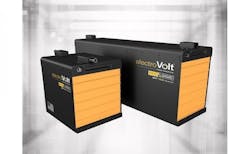PRISLogic Lithium-Iron Phosphate Batteries
PRISLogic Lithium-Iron Phosphate Batteries feature Thermal Shield Technology, passive thermal cooling, and custom-tailored Battery Management and Communication System. Engineered for safety and reliability, the prismatic cells provide the highest level of performance without the cost, complexity, and lead time of a custom-built solution. Designed to support a variety of specialized applications, including telecommunications, data center backup, material handling, and unmanned systems, the 12.8v modules are scalable to 800v.
LiFePO4 cells are known for their safety and reliability as they are less prone to experience thermal runaway associated with overcharge and lithium plating. electroVolt engineers have gone a step further to solve heat issues with its proprietary Thermal Shield Technology that improves thermal management, provides optimum distributed pressure on the electrode surface, and reduces cell-to-cell fire propagation.
To address a spectrum of end-use applications with varying demands, the innovative batteries also feature electroVolt's custom-tailored and optimizable Battery Management and Communication System that maximizes a customer's application's safety, reliability, and performance. BMS Beyond provides an accurate state of charge and discharge as well as data aggregation and comprehensive system communication. In addition, BMS Beyond enables the connection of multiple modules in series or parallel to meet system needs without losing critical system monitoring and control.
With nine customizable models available, electroVolt's energy storage experts work closely with customers to tailor every module and system configuration to meet specific needs and requirements, including charging, discharging, cycle life optimization, data aggregation, and system communication.
electroVolt's PRISLogic modules meet North American safety and EMI standards. They offer a wide operating temperature range of -4 to 113ºF (-20 to 45ºC), 4,000 cycle life, and easy maintenance.
- Active current limit indication
- Active / Adaptive cell balancing
- Power distribution management
- Integrated cold plate cooling and heating capability
- Isolated individual cell monitoring and balance circuits
- System safety monitoring and high voltage isolation detection
- Application-specific communications CAN 2.0/RS-485/Modbus
- Data collection, data management, and system state of health
- Accurate state-of-charge determination
